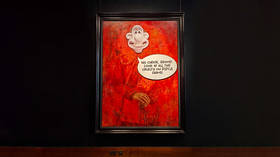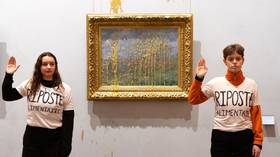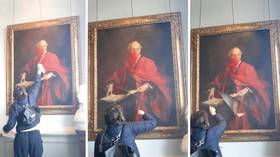King Charles portrait vandalized

Activists from the Animal Rising group have pasted a cartoon image over a recently unveiled portrait of Britain’s King Charles III at a London gallery. The move marks the latest in a series of attacks on artwork, as campaigners use vandalism to draw attention to their causes.
Campaigners from the group entered the hall at the Philip Mould Gallery, where the first official portrait of the king is being exhibited, and stuck a picture of Wallace, a character from the iconic ‘Wallace and Gromit’ animations, on the glass covering the painting. In addition to Wallace’s face, two activists pasted a speech bubble reading “No cheese, Gromit. Look at all this cruelty on RSPCA farms!”
King Charles is a patron of the Royal Society for the Prevention of Cruelty to Animals (RSPCA), which promotes animal welfare and operates in England and Wales. Founded in 1824, the organization is funded primarily by voluntary donations.
The charity runs a program called ‘RSPCA Assured’ aimed at increasing welfare standards for chickens, pigs, and salmon. It works with most of the UK’s largest supermarkets and claims that goods carrying the RSPCA Assured mark means that animals were reared to the welfare standards set by the organization.
Animal Rising said vandalizing the portrait was aimed at bringing attention to its own “damning investigation of 45 RSPCA Assured farms,” described by the group as “indefensible” and “effectively fraud.”
“With King Charles being such a big fan of Wallace and Gromit, we couldn’t think of a better way to draw his attention to the horrific scenes on RSPCA Assured farms!” campaigner Daniel Juniper said.
The activists also claimed that investigations of randomly selected farms had found “cruelty and suffering at every single one,” including scenes of “dead and dying baby chickens, dead pigs left in farm walkways, and salmon being eaten alive by sea lice.”
Philip Mould, the owner of the gallery where the portrait is on display, told local media that the painting was undamaged and that no arrests had been made.
The vast oil on canvas by Jonathan Yeo, depicting the monarch in the uniform of the Welsh Guards, was unveiled in May and sparked mixed reactions. Some praising the artwork, while others said the choice of red makes Charles III look “like he’s in hell” or as if he is “bathing in blood.”
The king’s portrait is the latest artwork to be targeted by activists. In recent years, works by artists such as Leonardo da Vinci, Vincent Van Gogh, Claude Monet, and Andy Warhol have been attacked. Earlier this year, a pair of activists from the ‘Riposte Alimentaire’ (Food Response) group threw soup at Monet’s painting ‘Springtime’ at the Museum of Fine Arts in the French city of Lyon. Earlier, campaigners from the same group splattered pumpkin soup on Leonardo’s ‘Mona Lisa’ at the Louvre in Paris.
In 2023, climate activists tried to vandalize an artwork by Monet at the Stockholm National Museum by dousing it with red paint and gluing themselves to the protective glass around the painting. Activists from British group Just Stop Oil threw tomato soup on Van Gogh’s ‘Sunflowers’ as two others glued themselves to ‘Peach Trees in Blossom’ at the Courtauld Gallery in London, permanently damaging the piece.














